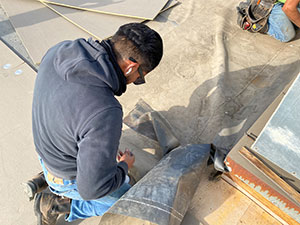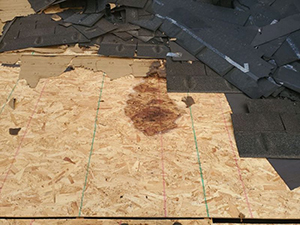
Commercial buildings in Brentwood, Tennessee often feature flat or low-slope roofing systems, which are ideal for maximizing space and supporting HVAC units, solar panels, and other equipment. While flat roofs are cost-effective and efficient, they do require diligent upkeep—especially in a climate like Brentwood’s, where heavy rain, seasonal storms, and temperature swings are common. Understanding how to maintain and repair flat roofs can help business owners and property managers protect their investment, avoid downtime, and extend the life of their roofing systems. Call the office of Glick Roofing Systems for commercial flat roof repair in Brentwood, TN on (615) 265-0598.
Common Types of Flat Roofs in Brentwood
There are several flat roofing systems commonly used on commercial buildings in the Brentwood area:
TPO (Thermoplastic Polyolefin): Popular for its energy efficiency and UV resistance.
EPDM (Rubber Membrane): Known for flexibility and weather resistance.
Modified Bitumen: Asphalt-based and reinforced for durability.
Built-Up Roofing (BUR): Multi-layered systems with gravel for added protection.
PVC Roofing: Durable and chemical-resistant, often used in restaurants and manufacturing.
Each system has unique repair needs, so identifying the correct material is the first step in addressing issues properly.
Signs Your Flat Roof Needs Repair

Early detection of problems can prevent extensive damage and high repair bills. Watch for these common signs: water leaks or stains inside the building, ponding water that doesn’t drain within 48 hours, cracks, blisters, or tears in the membrane, loose flashing around edges or rooftop units, and increased energy bills due to lost insulation.
Brentwood’s climate—with its warm summers and winter cold snaps—can cause roofing materials to expand and contract, leading to stress on seams and joints.
Typical Flat Roof Repairs
Commercial flat roof repair methods vary based on the roofing type and the extent of damage:
Patching: Sealing localized punctures or tears with compatible materials.
Seam Repairs: Reinforcing or resealing open seams on membranes.
Flashing Replacement: Repairing metal or rubber flashing around roof edges or penetrations.
Drainage Correction: Fixing clogged or poorly designed drains to prevent ponding water.
Coating Systems: Applying a liquid roof coating to restore waterproofing and extend life.
Timely, professional repairs help prevent minor issues from becoming major structural concerns.
Why Choose a Brentwood-Based Contractor?
Local experience matters. A commercial roofing contractor in Brentwood will understand regional weather challenges, be familiar with Tennessee building codes, provide faster response times for emergency repairs, and offer trusted service backed by local referrals.
Be sure to choose a licensed, insured, and experienced contractor who specializes in commercial flat roofing.
Flat Roof Repair Professionals
Commercial flat roofs are an asset, but they require consistent care to function effectively. If you suspect damage or see signs of aging, do not delay—early intervention can save time, money, and stress. By working with a qualified roofing professional in Brentwood, TN, you can keep your roof performing at its best and ensure the long-term safety and efficiency of your commercial property. Contact Glick Roofing Systems for flat roof repair on (615) 265-0598.
Frequently Asked Questions (FAQ)
Q: How long does a flat roof last before needing repairs?
A: Most flat roofs require repairs after 10–15 years of service, depending on the material, installation quality, and maintenance schedule. Regular inspections can extend their life.
Q: Can a flat roof be repaired in winter?
A: Yes, many flat roof repairs can be done year-round. However, extreme cold or moisture can impact the effectiveness of certain materials. A professional roofer will know the best approach.
Q: Should I repair or replace my flat roof?
A: If damage is limited and the roof is relatively new, repairs are often sufficient. If the roof has recurring issues or is nearing the end of its life, replacement may be more cost-effective.
Q: How can I prevent future damage to my flat roof?
A: Schedule semi-annual inspections, clear debris from the roof and drains, and address minor issues quickly to prevent more costly repairs.

